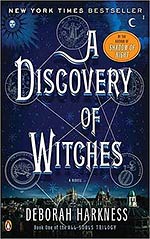
![]() antlered_rabbit
antlered_rabbit
2/14/2013
![]()
I was not a fan of this book.
It got a lot of hype when it came out and I think this impacted my perception of what it would be. I thought it was going to be Fantasy Literature in the sense that, say, 'Jonathan Strange and Mr. Norrell' is Fantasy Literature (capital F, capital L/full stop). It is not.
DoW is, at its heart, a story of a witch and a vampire who meet and fall in love. In the world the author has created, their love is forbidden, and is seen as a threat to those beings who hold power in the group that - ostensibly - governs and leads the three groups of magical beings. The witch is given a tragic past and a present as a historian of alchemical texts. The vampire has a long history and a current career as a well-respected scientist. All of these things give the author a great deal to work with.
She takes this wonderful premise and makes every mistake students are warned about in Writing 101. She tells you that her characters are falling in love, but doesn't make those emotions tangible; she abandons the narrative to provide backstory for characters that immediately disappear; scenes lag, overburdened by descriptions of wine and clothes, but without any real sense of danger. In the end, it never caught fire for me.
I never believed that (witch or not) a modern, successful, independant historian would want to become involved with a man who skulks around stalking her and insists on hiding facts to protect her. Yes, it makes sense that he has the sensibliites of a 1,000-year-old guy, but she doesn't. The protagonist goes from avoiding him and thinking vampires are scary beings that should be avoided to being in love. And his affection has little more basis. We are just told - and then should understand - that they have these feelings. And, failing to provide a basis for these feelings, it's hard to invest in every other decision they make to stay together against the odds.
It also feels like the author wanted to jam-pack her book with every single possible nifty idea she could put her hands on. Vampires, witches, deamons, fascinating old illuminated texts, yoga, wine, all beverages as tools of characterization, rowing, the crusades, time travel, controll of all the elements, Norwegian wolves, flying, evolution, dressage, very expensive modes of transportation and castles, sentient magical witch houses, the goddess Diana (but no others of that pantheon), ghosts that are everpresent but only provide backstory when it is narratively convenient, witch hunts in England, the Salem witch trials, something non-specific about Africa (it's where she's born and where her parents died, but we learn nothing else about magic/witches there), the Knights Templar, New Orleans vampires, and mDNA. In the end, none of it is very well done, so it all just feels like set decoration.
It's never clear what rules constrain the magic used by witches and the lives of vampires (the vampires were a particular mystery - they just seemed eternal, rather than vampiric). She tries to give us insight with information about DNA, but the explanation gets glossed over and doesn't end up making much sense. None of it makes much sense.
All that said, I feel bad about giving a bad review, so I'll just finish by saying that some people like this book very much, so you should probably read some of their reviews to get a balance of opinions.